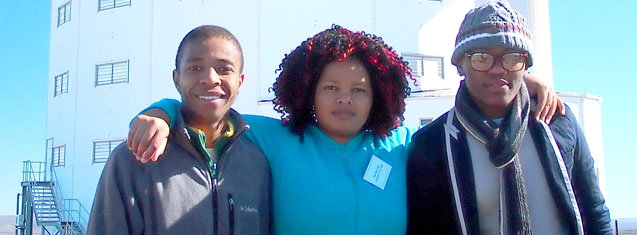Latest News Archive
Please select Category, Year, and then Month to display items
27 March 2023
|
Story Valentino Ndaba
![]()
This year, the University of the Free State will witness one of its biggest graduation seasons yet. A total of 19 ceremonies will take place this April. The Qwaqwa Campus will host four ceremonies from 14 to 15 April and the Bloemfontein Campus will host fifteen celebrations from 18 to 22 April 2023.
A grand total of 8 628 graduates will walk across the stage throughout the seven days. In addition, four honorary doctorates will also be conferred. Prof Stephen Brown will be awarded the Council Medal, Prof Mattheus Lötter is to receive the Chancellor's Medal.
Qwaqwa Campus Graduation Ceremonies

Bloemfontein and South Campus Graduation Ceremonies

For more information on guides and attires, click here.
Download the graduation schedule
here.
Students attend prestigious National Astrophysics and Space Science Programme
2014-08-22

From the left are: Thokozane Ngcongwane with Mbali Xaba and Thabo Kumalo (both third-year Physics and Chemistry students).
Three students from our Qwaqwa Campus – Thokozane Ngcongwane, Mbali Xaba and Thabo Kumalo – were recently selected to attend the prestigious National Astrophysics and Space Science Programme (NASSP). The programme – in partnership with the National Research Foundation (NRF) – ran for two weeks at the South African Astronomical Observatory (SAAO) in Cape Town.
The project targets students from formerly disadvantaged institutions of higher learning, where astronomy and astrophysics are not offered.
Students are invited to apply for the programme, with emphasis placed on students majoring in mathematics and physics. Students from other fields are also invited to apply, though. The programme allows for the development of black astronomers and astrophysicists, which are in demand in the ever-growing environment of astronomy in South Africa.
“Topics such as gravitational lenses, black holes, stellar evolution and the mysteries of cosmology were presented and students were invited to engage with the speakers during and after the presentations,” said Ngcongwane, a third-year Zoology and Entomology student.
The programme challenged them to work on basic astrophysical concepts in groups while individual written assignments were part of the learning process as well.
“Given the lack of information about the complexities of astronomy the students had, this was the most ideal time to learn about all matters astronomy and astrophysics as lectures offered a lot to young and excited minds,” Ngcongwane said.